Intermarkets' Privacy Policy
Donate to Ace of Spades HQ!
aceofspadeshq at gee mail.com
Buck:
buck.throckmorton at protonmail.com
CBD:
cbd at cutjibnewsletter.com
joe mannix:
mannix2024 at proton.me
MisHum:
petmorons at gee mail.com
J.J. Sefton:
sefton at cutjibnewsletter.com
Saturday Evening Movie Post [moviegique]: ARCO
Hobby Thread - February 7, 2026 [TRex]
Ace of Spades Pet Thread, February 7
Gardening, Home and Nature Thread, Feb. 7
Which feelings are okay in non-leftist social media? In K-12 protest marches?
The Classical Saturday Coffee Break & Prayer Revival
Daily Tech News 7 February 2026
Live, Love, Meme
FAFO Friday Cafe
Jim Sunk New Dawn 2025
Jewells45 2025
Bandersnatch 2024
GnuBreed 2024
Captain Hate 2023
moon_over_vermont 2023
westminsterdogshow 2023
Ann Wilson(Empire1) 2022
Dave In Texas 2022
Jesse in D.C. 2022
OregonMuse 2022
redc1c4 2021
Tami 2021
Chavez the Hugo 2020
Ibguy 2020
Rickl 2019
Joffen 2014
maildrop62 at proton dot me
TBD
Saturday Evening Movie Thread 12-15-2018 [Hosted By: TheJamesMadison]
A.I. Artificial Intelligence: A Revisitation
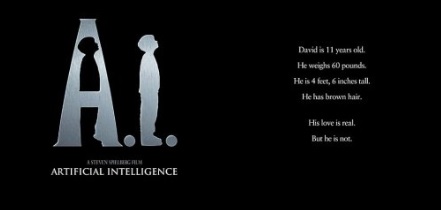
For those of you who pay very close attention to what I list I've been watching (which is hopefully previous few), you may remember that a few months back I went through the entirety of Stanley Kubrick's filmography in about two weeks. It was a wonderful experience since I love the man's movie's so much. But that experience birthed an idea in my mind that germinated for months until I finally followed through on it last week. I rewatched A.I. Artificial Intelligence, one of several films Kubrick had toyed with for years while leaving it unfinished.
In 1979, while Kubrick was filming The Shining in England, Steven Spielberg was also filming Raiders of the Lost Ark on the same studio lot. On a day when the lot was largely deserted, Spielberg and Kubrick found each other. In 1979, Spielberg was the wunderkind of Hollywood who had made Jaws and Close Encounters of the Third Kind, but Kubrick was still the man who had made 2001: A Space Odyssey and Dr. Strangelove. Spielberg was in awe, and Kubrick was very open, inviting the younger filmmaker to see some parts of the sets and inviting him to dinner. The two became friends for the rest of Kubrick's life.
It wasn't merely a personal relationship that developed, but a proto-professional one as well, for when Kubrick began toying with the idea of making a movie about a robot boy, he included Spielberg in many conversations. At one point in the early 90s, Kubrick even tried to convince Spielberg to make the film himself, insisting that the material was closer to the younger filmmaker's sensibilities that Kubrick's, but Spielberg never fully committed. There were rumors that Kubrick was going to take up A.I. as his next movie after Eyes Wide Shut, but we'll never know if that's for sure.
As a tribute to Kubrick after his death, Spielberg took on A.I. as his next project.
Troubles
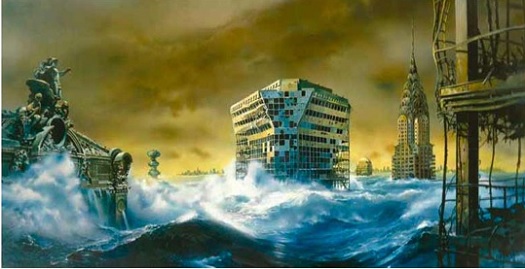
Based on what I've read, the reason that Kubrick had so much trouble tackling the project was the central character of David, the robot built to love. I think he could never quite answer the question to himself of whether David was something capable of love or just a program, playing out in service to his programming. As the artist in charge of bringing the vision to screen, he needed a firm answer, which he was never able to provide himself.
When Spielberg took over, it feels like he jumped at an answer (yes, David's love is real), and started making the film. However, that answer that Spielberg presumably provides in the movie actually ends up going against some things that are deeper into the movie's intentions, those elements that maintain the question from Kubrick's mind through to the final product. And that contradiction is what ended up fascinating me most about the movie upon this first watch of the movie in over a decade.
But first, let's cover some of the story.
The First Act
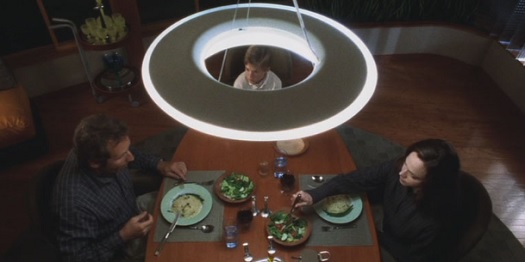
One of the things that Spielberg mentions when he talks about this movie is that it's essentially broken down into three parts. The first is everything up to David's abandonment, the second is everything from that point to the arrival at Manhattan, and the third is the rest of the film. He assigns chief authorship of the three parts to either himself or Kubrick. The first and third are all Kubrick's he says, while the second is mostly Spielberg.
I remember some early reviews of the film that got everything about that completely backwards. They assumed that the first part was Spielberg's because it dealt with the home and boyhood, the second was Kubrick's because it was "dark", and the third was Spielberg's because everyone hated it. However, when you actually watch the movie with Spielberg's explanation in the back of your mind, it becomes screamingly obvious about the questions of authorship.
The first act is one of the most Kubrickian pieces of filmmaking that Stanley Kubrick never lensed. The shot composition carries the kind of precision that Kubrick was famous for. The performances have a subtlety and exactness that feel as designed as anything anyone ever did for Kubrick. The scene of the first dinner with David, the robot before he is imprinted to love his mother, Monica, is so fulsomely Kubrick that I could believe it was filmed by his ghost.
In this first act, a grieving mother and father visit their real son who is cryogenically frozen as they await a cure to a life-threatening disease the boy carries. The father works for a major robotics company while his mother refuses to let go of her son. The head of the robotics firm offers a prototype robot to the family, one made in the form of a boy who is designed to love. They are beta-testers. Monica, the mother, is resistant to the very idea, but out of both curiosity and her own melancholy decides to keep the boy robot around. As she grows more fond of the little thing's quirks and she sees the possibility of finding some replacement for the boy she had lost, Monica imprints on David, a process that is irreversible. The twist comes when the real son, Martin, is brought back and the two children are set at odds with each other for the love of their mother. David's purpose is so simple that he has trouble understanding his place is this newly reformed family. After a series of misunderstood acts that look threatening, Monica must send David back to the manufacturers for destruction, but she cannot do it, leaving him in the woods to run away instead.
If this first hour or so of the film were the entire film, I think it might be the single best movie that Spielberg ever made.
The Second Act
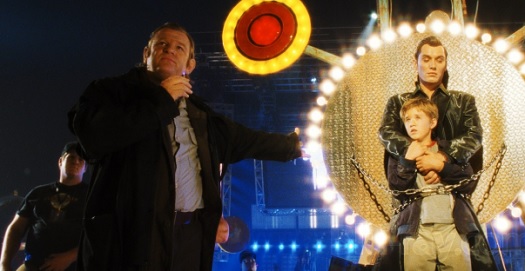
That's not to imply that the second act is bad by any means, but where the first act feels so perfect in execution, the second feels inelegant, especially in comparison.
Back to supposition of the backend of production. Kubrick worked on and off of A.I. for almost 15 years. In that time he made two films (Full Metal Jacket and Eyes Wide Shut) while also trying to develop other films (The Aryan Papers in particular). It's obvious that he never fully fleshed out every point, and I think this major second section of the movie is the part the received the least amount of his attention. We know that the Flesh Fair, where robots are torn apart to the cheers of a human audience, was the brainchild of Spielberg, but Rouge City and Doctor Know were mostly Kubrick's (Robin Williams actually recorded his part at the direction of Kubrick before the director's death). This is the section where the two filmmakers seem to clash the most. This is the section that feels the most Spielbergian.
It's much more active than the first or third acts, with many more moving parts. It introduces Jude Law's character Gigolo Joe, contains a lot of travel and an embrace of special effects in some rather gaudy ways that the other two parts don't share. The act itself is good, but a solid step down from the first.
Where the inelegance really steps up, though, is in two major plot points. The first is around the introduction of Gigolo Joe. Joe is a robot lover/prostitute who services human women. He goes into a hotel to meet a client, finds her dead and her husband there, having done the murder. Joe knows that this means he's in trouble, but the explanation for that is absent. Does Joe believe that he'll be apprehended for her murder? It's unclear why anyone would think so, and that murkiness opens up the second act with a sense of confusion. The second plot point is how David and Joe end up escaping Rouge City. The police arrive to arrest Joe, but leave their amphibicopter unprotected so David can just get into it, play around with the controls a bit, and save Joe. It's not a plot hole, but a point of plot convenience that's extremely unsatisfying that also feels like something that an artist with more time to iron out details would have figured out better.
Still, the images are stark, especially the use of the moon air balloon as the vehicle to steal rogue robots. I really like Joe as a character. The scene with Doctor Know is fun to watch. David's journey through different versions of love and hate, never finding any substitute for his core programming for his mother, is colorful and engaging.
The Third Act
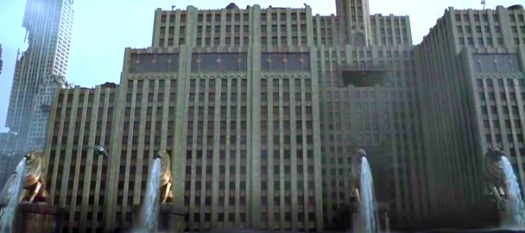
From the moment we join Joe and David flying over the flooded Manhattan, we are firmly in Kubrick territory again. The movie quiets back down and focuses again sharply on David. They fly through the ruins of New York and find the hint they had gathered in Rouge City, the Lions who Weep, statues of lions with water streaming out of their mouths and eyes a hundred feet above the ocean.
It is in this building that the robotics firm has established a presence in wait for David's arrival, but there are surprises waiting for David, all that look exactly like him. David had been told by everyone around him that he was unique, one of a kind. But, according to Professor Hobby, David's creator, he's merely the first of a kind. Is David's love for his mommy unique anymore? He lashes out against the other active David, smashing his head in with a lamp. When Professor Hobby leaves to find others to talk with David, the robot, left with no meaning anymore, throws himself from the building into the water where he sees his next salvation. Joe saves David only to switch places with him in the amphibicoptor as Joe gets captured and David takes the craft into the ocean to face the Blue Fairy (more about her in a little bit) where he spends several thousand years begging her to become a real boy.
Before moving on to the coda, I just want to take a second to mention the marvelous imagery of this section. The lions weeping, the sight of New York, the line of robot boys, David peering through the face of another David to see where his first memory came from. It's all so striking and feels more like it came from the imagination of Kubrick than Spielberg. No offence to Mr. Spielberg, who is a very fine director, but Kubrick's use of imagery always feels more purposeful and thought out.
The Ending
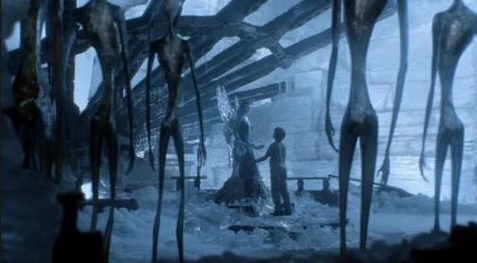
According to Spielberg and Ian Watson (who wrote Kubrick's original treatment for the movie), this ending isn't a creation of Spielberg, but what Kubrick wanted. Kubrick wasn't known for rank sentimentality, so that reading of the ending, if you have it, might need to be revisited.
I recall talking with a teacher of mine after the movie had been out for some time who thought that the film overall was good, but the ending made it bad. I hung along with this opinion for a very long time, thinking that the ending was a mistake, until I watched the movie again recently. Instead of a schmaltzy coda that gave David everything he wanted, I saw a bitter, cynical ending about how David never got what he actually wanted. And that second reading of the film was much sadder to me.
In order to get to that reading though, we have to look at some of the mechanics of the ending.
David has run out of battery power in the ensuing two thousand years when a race of advanced robots wakes him from his sleep. They read his mind and exclaim that this robot knew humans! The next thing we see is David waking up in the home he shared with Monica. Called out to by a voice, he finds the Blue Fairy who promises to give David a long life in this place, but David only wants Monica, his mommy. The Blue Fairy grants his wish and disappears.
Before David sees Monica, though, he's visited by one of the robots who explains to him that they can bring back Monica from the dead, but she will only last one day before she will expire never to return again. Does he really want this? Yes, he wants his mommy. The robots decide to give him what he wants. David proceeds to have the happiest day with his mommy, coloring, cooking, and just having a joyful time before Monica begins to grow tired. David puts her to sleep and falls asleep next to her with the narrator's voice heavily implying that David never woke up again.
On the surface, this seems like David got everything that he wanted, and he received a happy ending, an interpretation aided by the very lovely music John Williams scored for the scene, but I think a different interpretation is in order.
David never actually woke up from his sleep, and the robots put him into a computer simulation. They wanted to learn about either humans or their early ancestor robots and thought that they could learn from David, hoping to use him to understand in greater deal than they already knew. They offered him a long life to explore, and what did he ask for? His mommy. Knowing that they could get no more from him, they learned what they could from his single day fulfilling his purpose of loving and being loved, and they shut him down. They put him down like a sick dog, because that's all he was good for.
Pinocchio
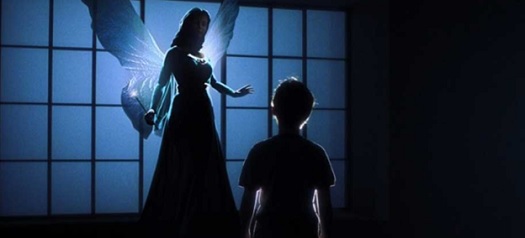
The single largest motif of the film is the children's story Pinocchio. This is another assumption that early film viewers made about the film, that the idea of including the story of the marionette into the film was Spielberg's idea. According to everyone involved with the film, it was Kubrick's. There's a small detail in Close Encounters of the Third Kind where the main character talks up the movie version of Pinocchio and tries to convince his family to go to a screening instead of Goofy Golf. And yet, it was still Kubrick's idea.
Like many motifs, the images tied to the ideas are there to highlight the themes and characters of the film. The parallels between Pinocchio's journey and David's are obvious, but the parallels end at appearance, and I think that's the point.
In the original story, Pinocchio goes through his adventures, grows, and eventually does become a real boy. David, on the other hand, is on a facsimile of Pinocchio's journey. He never really grows, and he never becomes a real boy. Even his final moments are a deception (perhaps a self-deception). It's an illuminating thread that helps highlight the central ideas at the core of the film, and I find it rather elegantly intertwined.
The contrast created the idea in my head that Kubrick wanted to say with finality that David's entire life was an act of cruelty. His creation, the imprinting, his abandonment, his journey, and his final day were all deceptions that acted only to create something that could never fully fulfill its mission. If David's emotions are real, then building a never aging robot who can love is purely cruel. He can never grow. He can never develop. He can never find satisfaction. The only way to give him anything like that is to end his existence once he gets a temporary sense of it.
A Note or Two
Thank you to everyone who has prayed for my family this week. Your thoughts have helped us through a difficult time for our family.
Also, I will be on a boat at sea right about now, so I can't comment tonight along with you. However, I will be reading them later, red pen in hand, to correct all of your incorrect opinions.
Movies of Today
Opening in Theaters:
Spider-Man: Into the Spider-verse
The Mule
Mortal Engines
Next in my Netflix Queue:
The Tale of Princess Kaguya
Movies I Saw This Week:
Predestination (Netflix Rating 5/5 | Quality Rating 3.5/4) Poster blurb: "Wonderfully twisty with a great pair of central characters." [Netflix DVD]
Altered States (Netflix Rating 3/5 | Quality Rating 2.5/4) "A bunch of interesting ideas in search of a story." [Netflix DVD]
Enemy Mine (Netflix Rating 2/5 | Quality Rating 1.5/4) "Represents the absolute worst of science fiction. Obvious, plodding, rote, predictable, and preachy." ["Library"]
The Ballad of Buster Scruggs (Netflix Rating 5/5 | Quality Rating 4/4) "Makes me want more directors to direct a series of short films around a theme. Absolutely fantastic." [Netflix Instant]
The Experiment (Netflix Rating 2/5 | Quality Rating 1/4) "Predictable, unbelievable, and just not that well written." [Netflix Instant]
The Place Beyond the Pines (Netflix Rating 4/5 | Quality Rating 3/4) "Intelligent, if a bit emotionally underwhelming, tale of violence." [Netflix Instant]
The Lord of the Rings (Netflix Rating 3/5 | Quality Rating 2/4) "An interesting failure of an adaptation that feels more like a highlight reel than a story." [Personal Collection]
Contact
Email any suggestions or questions to thejamesmadison.aos at symbol gmail dot com.
I've also archived all the old posts here, by request. I'll add new posts a week after they originally post at the HQ.
JohnFNotKerry: "top ten? ..."
Gunslinger: "That extremely beautiful Amaryllis pic… Grr ..."
SuperCountyJudgeCandidateSuperRonNirenberg-Buffest Hack Politician Ever: "Thank you moviegique for an always enjoyable and i ..."
Braenyard - some Absent Friends are more equal than others _: "I'd have been here sooner but I couldn't find the ..."
Pug Mahon, Rock 'n' Roll Martian: "Last movie I saw in the theater was one of them bu ..."
Accomack : "Yep ..."
BarelyScaryMary: "Saturday ONT, yay! ..."
nurse ratched: "Whoohoo! LETS GO SEAHAWKS! ..."
Braenyard - some Absent Friends are more equal than others _: " shitweasels ..."
Blanco Basura - Z28.310 [/i] [/b] [/u] [/s]: "Yay, ONT! ..."
Blue retard: "World Championships are more coveted by athletes t ..."
Saturday Evening Movie Post [moviegique]: ARCO
Hobby Thread - February 7, 2026 [TRex]
Ace of Spades Pet Thread, February 7
Gardening, Home and Nature Thread, Feb. 7
Which feelings are okay in non-leftist social media? In K-12 protest marches?
The Classical Saturday Coffee Break & Prayer Revival
Daily Tech News 7 February 2026
Live, Love, Meme
FAFO Friday Cafe
Paul Anka Haiku Contest Announcement
Integrity SAT's: Entrance Exam for Paul Anka's Band
AllahPundit's Paul Anka 45's Collection
AnkaPundit: Paul Anka Takes Over the Site for a Weekend (Continues through to Monday's postings)
George Bush Slices Don Rumsfeld Like an F*ckin' Hammer
Democratic Forays into Erotica
New Shows On Gore's DNC/MTV Network
Nicknames for Potatoes, By People Who Really Hate Potatoes
Star Wars Euphemisms for Self-Abuse
Signs You're at an Iraqi "Wedding Party"
Signs Your Clown Has Gone Bad
Signs That You, Geroge Michael, Should Probably Just Give It Up
Signs of Hip-Hop Influence on John Kerry
NYT Headlines Spinning Bush's Jobs Boom
Things People Are More Likely to Say Than "Did You Hear What Al Franken Said Yesterday?"
Signs that Paul Krugman Has Lost His Frickin' Mind
All-Time Best NBA Players, According to Senator Robert Byrd
Other Bad Things About the Jews, According to the Koran
Signs That David Letterman Just Doesn't Care Anymore
Examples of Bob Kerrey's Insufferable Racial Jackassery
Signs Andy Rooney Is Going Senile
Other Judgments Dick Clarke Made About Condi Rice Based on Her Appearance
Collective Names for Groups of People
John Kerry's Other Vietnam Super-Pets
Cool Things About the XM8 Assault Rifle
Media-Approved Facts About the Democrat Spy
Changes to Make Christianity More "Inclusive"
Secret John Kerry Senatorial Accomplishments
John Edwards Campaign Excuses
John Kerry Pick-Up Lines
Changes Liberal Senator George Michell Will Make at Disney
Torments in Dog-Hell
The Ace of Spades HQ Sex-for-Money Skankathon
A D&D Guide to the Democratic Candidates
Margaret Cho: Just Not Funny
More Margaret Cho Abuse
Margaret Cho: Still Not Funny
Iraqi Prisoner Claims He Was Raped... By Woman
Wonkette Announces "Morning Zoo" Format
John Kerry's "Plan" Causes Surrender of Moqtada al-Sadr's Militia
World Muslim Leaders Apologize for Nick Berg's Beheading
Michael Moore Goes on Lunchtime Manhattan Death-Spree
Milestone: Oliver Willis Posts 400th "Fake News Article" Referencing Britney Spears
Liberal Economists Rue a "New Decade of Greed"
Artificial Insouciance: Maureen Dowd's Word Processor Revolts Against Her Numbing Imbecility
Intelligence Officials Eye Blogs for Tips
They Done Found Us Out, Cletus: Intrepid Internet Detective Figures Out Our Master Plan
Shock: Josh Marshall Almost Mentions Sarin Discovery in Iraq
Leather-Clad Biker Freaks Terrorize Australian Town
When Clinton Was President, Torture Was Cool
What Wonkette Means When She Explains What Tina Brown Means
Wonkette's Stand-Up Act
Wankette HQ Gay-Rumors Du Jour
Here's What's Bugging Me: Goose and Slider
My Own Micah Wright Style Confession of Dishonesty
Outraged "Conservatives" React to the FMA
An On-Line Impression of Dennis Miller Having Sex with a Kodiak Bear
The Story the Rightwing Media Refuses to Report!
Our Lunch with David "Glengarry Glen Ross" Mamet
The House of Love: Paul Krugman
A Michael Moore Mystery (TM)
The Dowd-O-Matic!
Liberal Consistency and Other Myths
Kepler's Laws of Liberal Media Bias
John Kerry-- The Splunge! Candidate
"Divisive" Politics & "Attacks on Patriotism" (very long)
The Donkey ("The Raven" parody)

